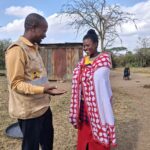By Njeri Murigi | healthjournalist3@gmail.com
In an effort to enhance the skills of journalists and embrace new media technologies, Media for Environment, Science, Health and Agriculture (MESHA) recently conducted a three- day training session on Mobile Journalism (MOJO).
The training brought together 25 journalists, ranging from those with little know-how about mojo to complete novices.
Trainees were tutored on how to use their mobile phones in capturing stories, filming, planning, editing, general presentation and packaging of content.
The program, which started in 2022, has now benefited a total of 53 journalists over the past three years. The program trained 15 journalists in 2022, and a similar number in 2023.
This year, the number increased to 23, with 15 journalists attending training in person held in Nairobi and another eight participating virtually from Kenya, Zambia, Malawi, Uganda, and Tanzania. Three learners made it to the end.
“We introduced this program because the current media landscape is embracing multimedia journalism, and journalists must be up to date with this transformation,” said MESHA Secretary, Aghan Daniel.
Adding “We are looking at a situation where journalists can utilize the power of their phones to tell stories. That is why the program aims to ensure that journalists employ the mojo component in all stories they do.”

Susan Ndunda, a radio and television reporter, highlighted the significant advantages of mobile joumalism, particularly its convenience and immediacy. Ndunda recounted her recent experience at the United Nations Conference of Parties on Climate Change (COP28), where she utilised her newfound skills to conduct impactful interviews with women from Narok who had won an award for their environmental initiatives.
“Using my mobile phone, I was captured high-quality video interviews on the spot, edit them quickly, and broadcast them almost in real-time,” Ndunda explained.
“This not only made my work more efficient but also allowed me to share these important stories with a wider audience almost instantly.”
She noted that it was at MESHA Secretary’s insistence that she rapidly learnt mojo which saw her outperform colleagues in Dubai at the COP28, an event that brought together nearly 85,000 delegates last December.
According to Aghan, this year’s training was a bit different from the previous ones because they invited non-journalists from other CASPR partners where MESHA was recently initiated. Brenda Bonareri from WACI Health represented the CASPR partners. Despite her not having journalistic background she excelled during the training, emerging as one of the top trainees.
Another aspect that made this year’s class different is that all trainees first needed to express their interest in attending the training and pitch a story or project idea they would pursue afterward. The quality of the pitches that MESHA received was a testament of their enthusiasm and commitment to making the most of this opportunity.
“The aim of inviting other CASPR partners was to build their capacity, ensuring they understand how journalists work and gain skills to better interact with the media and independently capture their project milestones in the absence of the media,” said Aghan.
“The peak of the project will be the awarding of journalists who have shown excellence in Mojo, through utilising skills learned during the training. The awards will be internal, and MESHA will award both quality and quantity once a trainee submits five completed projects.”
Tabitha Munyiri, a past trainee, said that it is because of such training that she is now an expert in mobile journalism. She emphasised the transformative impact of that program on her career and urged for more resources to be allocated to train many more journalists.

Munyiri highlighted that increased funding and support would enable a larger number of journalists to acquire essential skills, ultimately enhancing the quality and reach of their reporting on critical issues.
According to Teresia Gitau, a MESHA member, the training will go far in guiding her how to utilize available technology for effective digital storytelling.
As a parting shot, Aghan noted that bringing on board partners who are not journalists was key in providing to them lessons in effective and ad hoc storytelling which are valuable for advocacy, especially in the absence of journalists during critical activities.
The training will also enhance networking between other café convenors in Uganda Zambia, Zimbabwe, Tanzania and Malawi leading to additional storytelling opportunities and visibility.









